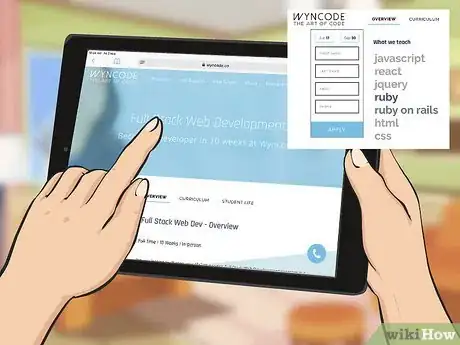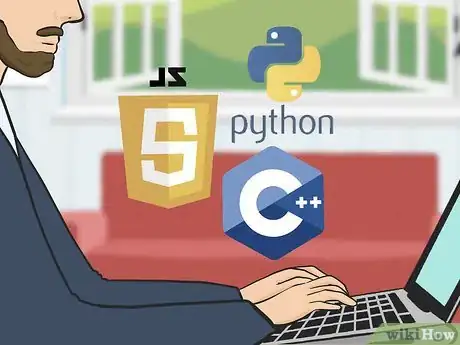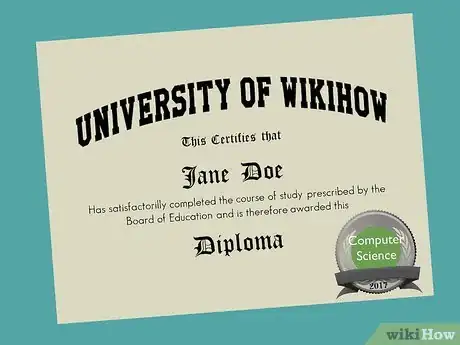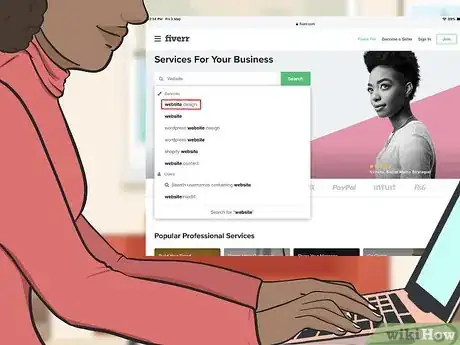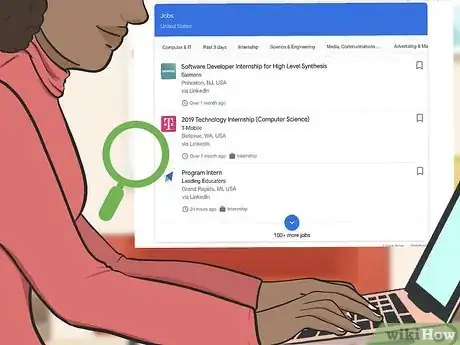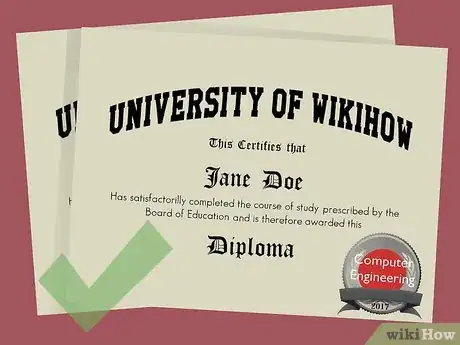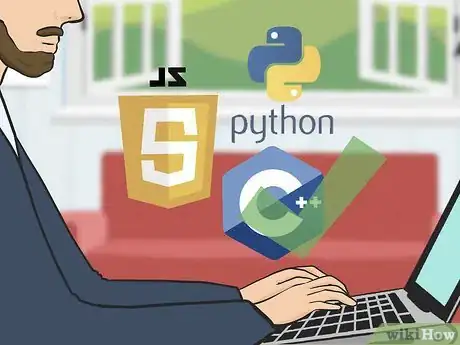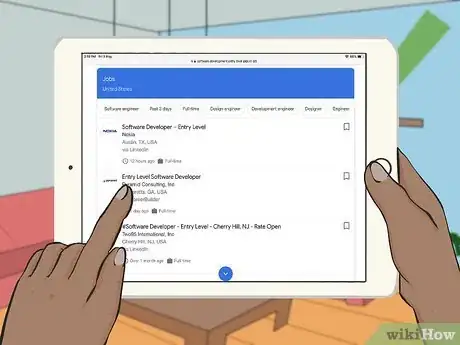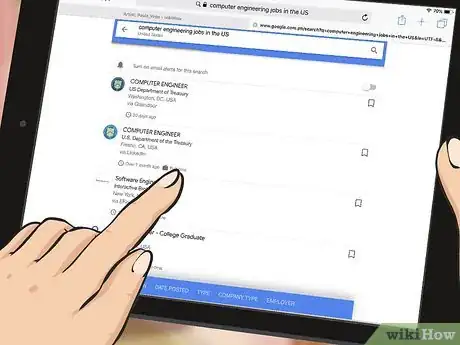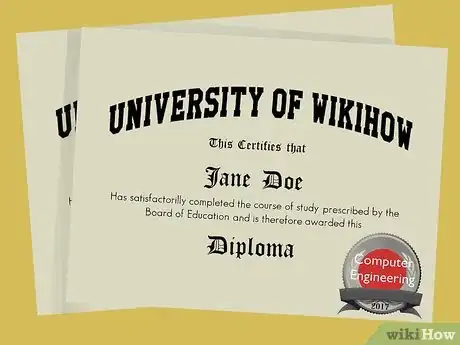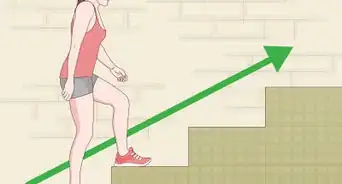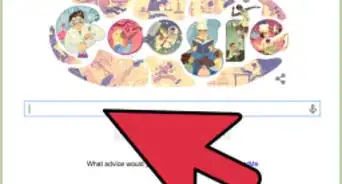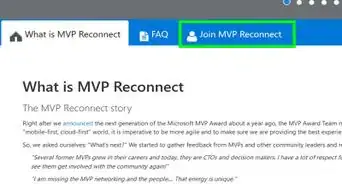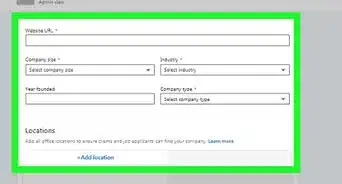This article was co-authored by Ken Koster, MS. Ken Koster is the Co-founder and CTO of Ceevra, a medical technology company. He has over 15 years of experience programming and leading software teams at Silicon Valley companies. Ken holds a BS and MS in Computer Science from Stanford University.
There are 9 references cited in this article, which can be found at the bottom of the page.
This article has been viewed 491,127 times.
The job market for computer based jobs is constantly expanding, so this is a great time to get your foot in the door. Whether you’re interested in programming, software engineering, or information technology (IT), it's not too hard to increase your chance of getting a job working with computers. By building your knowledge base and skill set and gaining the right experience, you can have a much better shot at getting a job in computers.
Steps
Getting a Job in Programming
-
1Learn to code HTML and CSS to know the basics of webpage layout. HTML and CSS are fundamental languages used to design, create, and modify webpages, so being able to use them is crucial to programming. Use online tutorials or introductory coding courses at a local college to develop this fundamental knowledge.[1]
- There are countless HTML and CSS tutorials online that you can find by simply searching for them. If you would prefer to learn them in a more structured method, your best bet will be taking an introductory computer science course.
Fun Fact: Technically, HTML and CSS aren’t actually programming languages. HTML is a markup language, while CSS is a stylesheet.
-
2Become fluent in a programming language. Programming languages are the bread and butter of computer programmers, so it’s important to have an in-depth understanding of at least one, if not more. Enroll in a programming course or use an online tutorial to develop a mastery of a coding language you can use in a programming job.[2]
- All things being equal, Javascript is the most widely used programming language, so learn this one to have the most widely applicable coding knowledge.
- Python and C++ are also very popular. Consider learning these in addition to Javascript to give yourself an edge in applying for programming jobs.
Advertisement -
3Earn a degree in computer programming to build your knowledge base. This isn’t always a strict requirement for entry-level jobs in programming, but earning a programming degree is a great way to develop a strong grasp of the fundamentals. Attending a computer program will also give you a good opportunity to begin creating a professional network that you might be able to use down the line to help you land a job.[3]
- For example, take active steps to get to know your professors and build a rapport with them. They may be able to write recommendations for you later when you apply for jobs or even tip you off to job opportunities in your field.
EXPERT TIPKen Koster is the Co-founder and CTO of Ceevra, a medical technology company. He has over 15 years of experience programming and leading software teams at Silicon Valley companies. Ken holds a BS and MS in Computer Science from Stanford University.Master's Degree, Computer Science, Stanford University
 Ken Koster, MS
Ken Koster, MS
Master's Degree, Computer Science, Stanford UniversityUse your summers to build your professional experience. Ken Koster, software engineer, advises: "If you're majoring in computer science in college, you have two or three opportunities to do internships during summers while you're still in school. Take advantage of those, try different things, and figure out what works for you."
-
4Do side projects and freelance work to gain experience programming. These should be extracurricular activities you do in your free time to build your portfolio and accumulate experience creating software. Build apps, create websites, or contribute to open source projects to develop this programming experience. Use freelance job listing websites to find odd jobs and side gigs you can do to beef up your work experience as a programmer.[4]
- For example, the website Fiverr has a variety of remote freelance jobs involving programming and software development.
- These don’t necessarily have to be tremendous undertakings. Building a simple weather app or creating a website devoted to a blog will suffice at this stage.
- Make sure to add whatever you create to your online portfolio so that other programmers, as well as potential employers, can see your work.
-
5Find a programming internship to gain valuable work experience. Programming internships will give you experience coding and developing software in a professional capacity, which potential employers will greatly appreciate. They also allow you to expand your professional network and give you a convenient entry into the computer industry.[5]
- If you’re in school, check with your school’s career center to see if they can help you find an internship that aligns with your interests.
- If you’re not in school, look on the websites of tech companies you’re particularly interested in to see if they offer internship opportunities.
EXPERT TIPKen Koster is the Co-founder and CTO of Ceevra, a medical technology company. He has over 15 years of experience programming and leading software teams at Silicon Valley companies. Ken holds a BS and MS in Computer Science from Stanford University.Master's Degree, Computer Science, Stanford University
 Ken Koster, MS
Ken Koster, MS
Master's Degree, Computer Science, Stanford UniversityTry out different fields to see what environment suits you. According to Ken Koster, software engineer, "If you know you really like programming, the next step is to do internships to find out what kind of environment you’d be happy working in. The work definitely does change when you go into industry, academia, or research. Those are all pretty different environments to work in, and some people might enjoy one and not the other."
-
6Apply for a job at a company that specifically interests you. You’re far more likely to actually land a job if you’re tailoring your application to a specific company. Research what sorts of projects that company undertakes and tailor your application in a way that demonstrates how good of a fit you are.[6]
- For example, if a company focuses on developing gaming apps, emphasize your past experience creating gaming apps in your cover letter.
Pursuing a Career in Software Engineering
-
1Get a secondary degree in computer science or engineering. Many employers require their software engineers to earn at least an associate’s degree or certificate in a relevant field. A lot of software engineers earn their degrees in computer science, but other popular areas of study include business management, computer engineering, and mathematics.[7]
- To be most competitive, aim to earn a bachelor’s degree in a particular field instead of just an associate’s.
-
2Make sure you’re fluent in HTML, CSS, and a programming language. Software engineers need to have an in-depth understanding of how software is developed so that they can expand, re-create, or adapt that software to changing systems and needs. You can learn these languages through online tutorials, college courses, or a coding boot camp.[8]
- You can also build and develop these skills through an entry-level software development position, if you have the skills to work in such a position.
- Javascript, Python, and C++ are all popular programming languages that would be particularly useful for a software engineer to know.
-
3Decide on a specialization that you want to pursue. Software engineers often play a specialized role as part of a team of other engineers and developers. Examples of specialized roles include back-end engineer, front-end engineer, operations engineer, and test engineer.[9]
- Back-end engineers spend most of their time working on the services and algorithms that form the core of a particular system and play a vital role in how that system works.
- Front-end engineers focus on user interface and making the services that back-end engineers write accessible to the user.
- Operations engineers ensure that the infrastructure of a system is reliable and running at all times.
- Test engineers build systems that test the code that other engineers have written to make sure it’s fully reliable and running correctly.
Tip: An engineer who performs all of these functions is called a “full-stack engineer.” This is very rare for an entry-level position, but you may be asked to be a full-stack engineer if you want to work at a start-up with relatively few employees.
-
4Gain work experience with software development and programming. Work an internship or an entry-level position, if possible, developing software and writing code to continue building your technical skills in a professional environment. Most employers looking to hire a software engineer will require some professional experience other than side projects, so this is very important for starting a career as an engineer.[10]
- There are some entry-level software engineer positions that require little or no prior job experience, but these are relatively rare.
-
5Build your collaboration and leadership skills. Being a software engineer doesn’t just require good technical skills; it also requires that you be able to work effectively as part of a team. Take a job that involves a lot of teamwork and project management in order to build these soft skills and make you a more competitive applicant.[11]
- For best results, take this type of job at a software development company or as part of a team that helps develop software.
-
6Apply for an engineering job in your specialization. Search job boards and listings for a job whose criteria specifically mentions the specialization you chose for yourself. Applying for this type of job will give you the best chance of being hired.[12]
Finding a Job in IT
-
1Take courses or earn a degree in computer science. A lot of companies will not require their IT staff earn a secondary degree in computer science, but will require that applicants have some prior computer education or skills. To be a competitive applicant, take at least 1 or 2 courses in computer science at an accredited institution.[13]
- Earning a certificate or a degree in computer science or a related field is a good way to demonstrate your technical competence and knowledge base to potential employers, so it’s worthwhile to pursue an actual degree if you can.
-
2Work a general IT or IT-adjacent job, if possible. This can be something as simple as working at a help desk or in a computer lab while you’re in school. Any job that involves working closely with computers and providing technical support to other people will help give you a foot in the door when you go to apply for full-time IT jobs.[14]
- Many colleges offer work-study programs for their students to work part-time while they’re in school. See if you can use this type of program to get a job in your school’s computer lab or as part of their technical support staff.
- If you can’t get an IT or IT-adjacent job, see if you can find an internship that would involve the same skills and responsibilities. This is the next best way to gain entry into the IT industry.
-
3Accumulate transferable skills in a non-IT job if you can’t work an IT job. Any job that involves inspecting for errors, solving problems in complicated systems, or interacting with clients will give you skills you can also use in an IT job. Work this type of job to build your resume and develop your relevant skills while you pursue your computer education and apply for IT jobs.[15]
- For example, working as a car mechanic involves inspection and problem solving skills that you can use to demonstrate your fitness for an IT job involving similar responsibilities.
- Be sure to list the relevant skills that were involved in this job on your resume so that it stands out when you go to apply for an IT job.
-
4Begin applying for IT jobs in the fall semester before you graduate. This is normally when large companies begin to recruit college graduates for IT positions, so this is the most opportune time to start sending out applications. Applying early also gives you ample time before you actually graduate to find a job![16]
- Attend job fairs held at or near your college to find out which companies are actively hiring graduates for IT positions.
- You can also talk to someone at your school’s career center to get some help finding IT job openings at different companies.
Community Q&A
-
QuestionWhat should I do after graduation if I am a computer science +2 student?
 Community AnswerYou can learn computer programming, web designing and development, graphic design or start an internship.
Community AnswerYou can learn computer programming, web designing and development, graphic design or start an internship. -
QuestionWill Java help me get a job in IT?
 Community AnswerYes, it could.
Community AnswerYes, it could. -
QuestionWhat should I study as a high school student if I want to work in the IT field?
 Community AnswerIt depends on what kind of subjects your school offers; ask around if you are not sure. The main subjects that involve IT would be things like programming or computer science.
Community AnswerIt depends on what kind of subjects your school offers; ask around if you are not sure. The main subjects that involve IT would be things like programming or computer science.
References
- ↑ http://devcodehack.com/make-money-programming/
- ↑ http://devcodehack.com/make-money-programming/
- ↑ https://adzerk.com/blog/getting-first-programming-job/
- ↑ https://medium.com/@christophelimpalair/no-experience-heres-how-you-get-a-programming-job-c298739ab381
- ↑ https://daedtech.com/programming-job-without-degree/
- ↑ https://www.thesoftwareguild.com/blog/first-programming-job/
- ↑ https://www.indeed.com/career-advice/what-does-a-software-engineer-do
- ↑ https://www.indeed.com/career-advice/what-does-a-software-engineer-do
- ↑ https://www.wayup.com/guide/entry-level-software-engineer-job-guide/
- ↑ https://www.indeed.com/career-advice/what-does-a-software-engineer-do
- ↑ https://www.indeed.com/career-advice/what-does-a-software-engineer-do
- ↑ https://www.indeed.com/career-advice/what-does-a-software-engineer-do
- ↑ https://www.makeuseof.com/tag/get-entry-level-t-helpdesk-technical-support-job/
- ↑ https://www.businessnewsdaily.com/8239-getting-a-job-in-it.html
- ↑ https://www.makeuseof.com/tag/get-entry-level-t-helpdesk-technical-support-job/
- ↑ https://www.businessnewsdaily.com/8239-getting-a-job-in-it.html
About This Article
To get a job working in computers, you'll probably need to learn how to code and program, since that's a big part of most computer jobs. You can enroll in classes to learn, or you can try teaching yourself using free online tutorials. You might even consider enrolling in a computer science program to learn everything you need to know. If you're looking for an entry-level computer job that requires less experience, look into getting a general IT job. However, you'll probably still need to show that you have some experience working with computers, so you might want to take 1 or 2 computer science courses. For tips on how to pursue a career in software engineering, scroll down!
